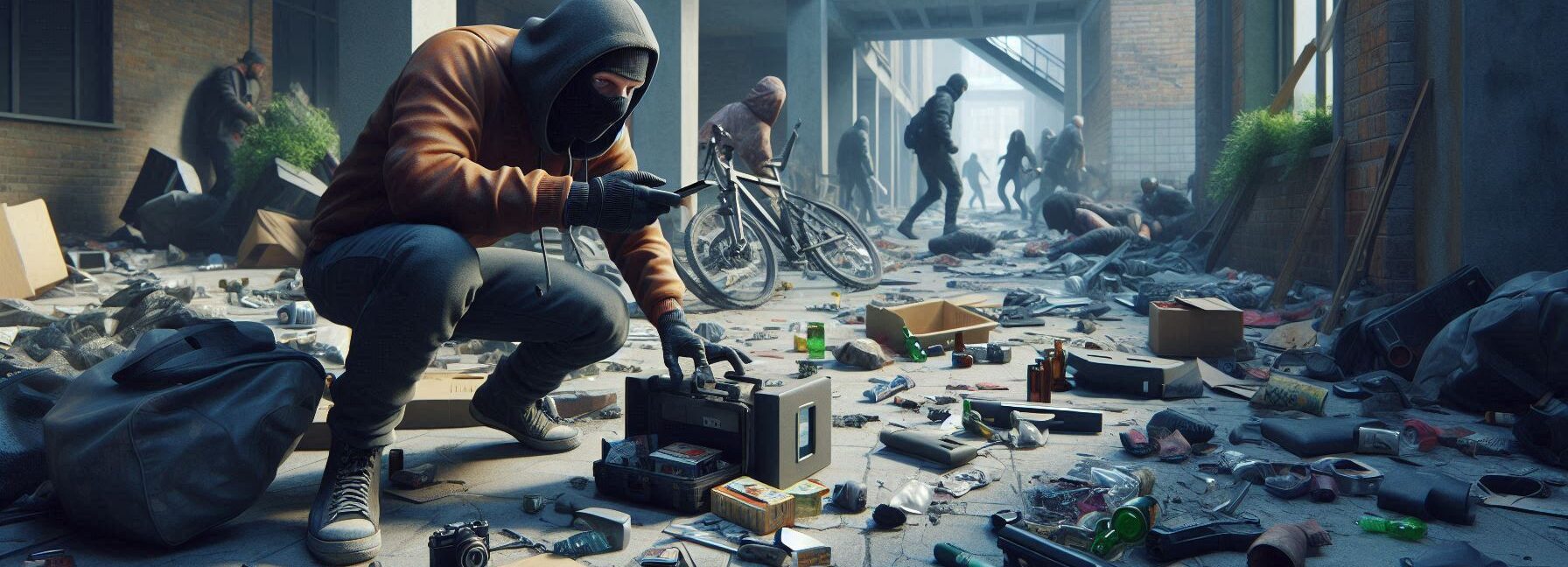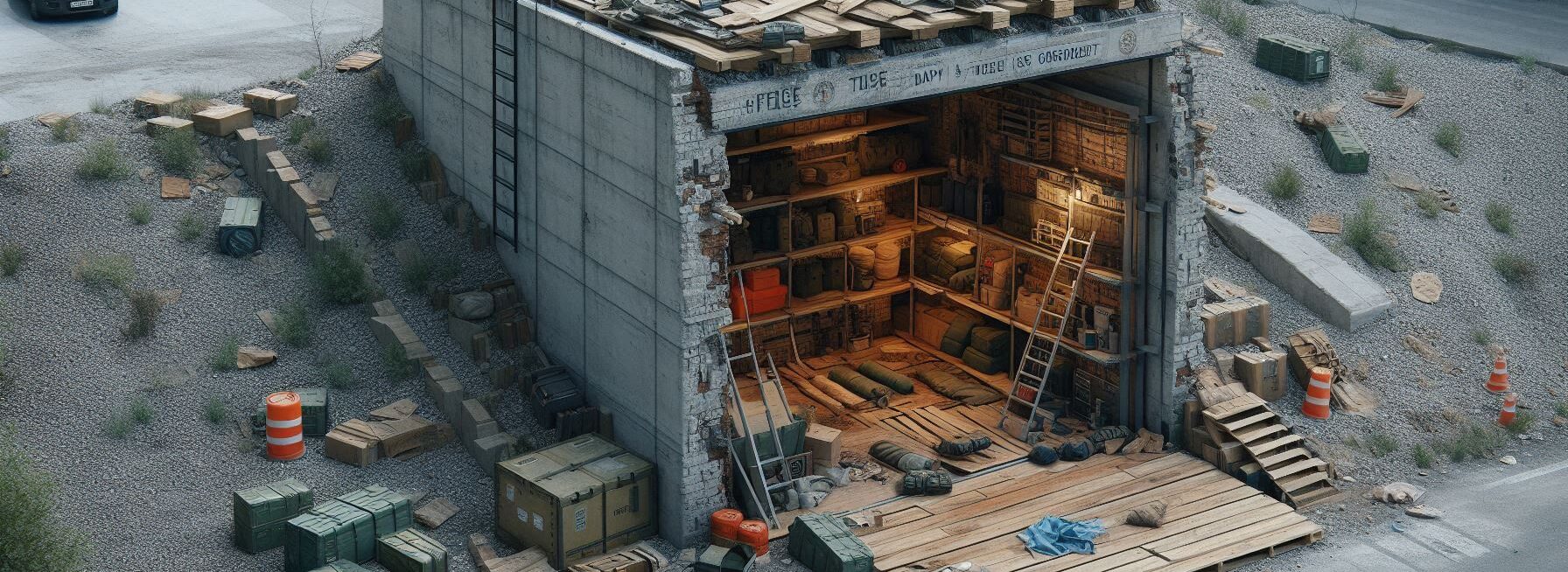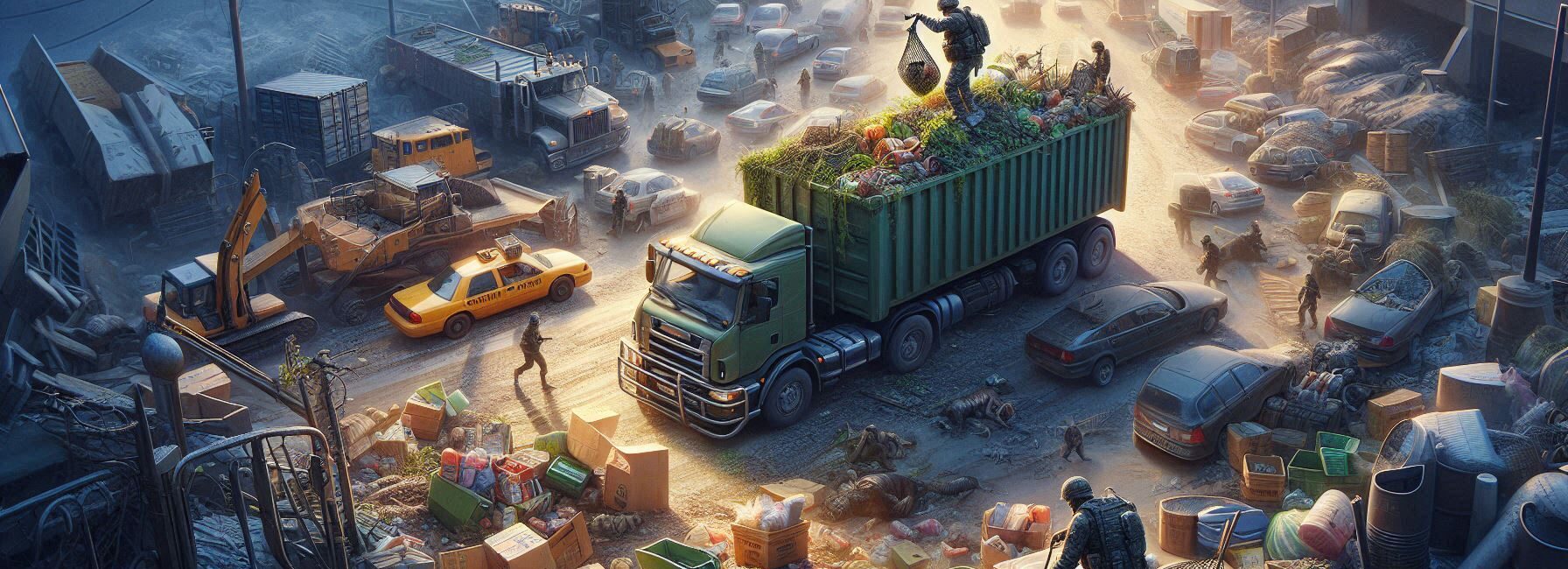Knowing basic urban survival skills can make a big difference in a world where city living can sometimes feel too busy. Think about how hard it would be to get food when your local grocery shop is out of stock or to get stuck at a subway station during a power outage. It seems scary, but don't worry! You can handle these problems like a pro with a little planning and expertise. Let's talk about some important talents that everyone should know how to use in the city.
Navigating Without GPS
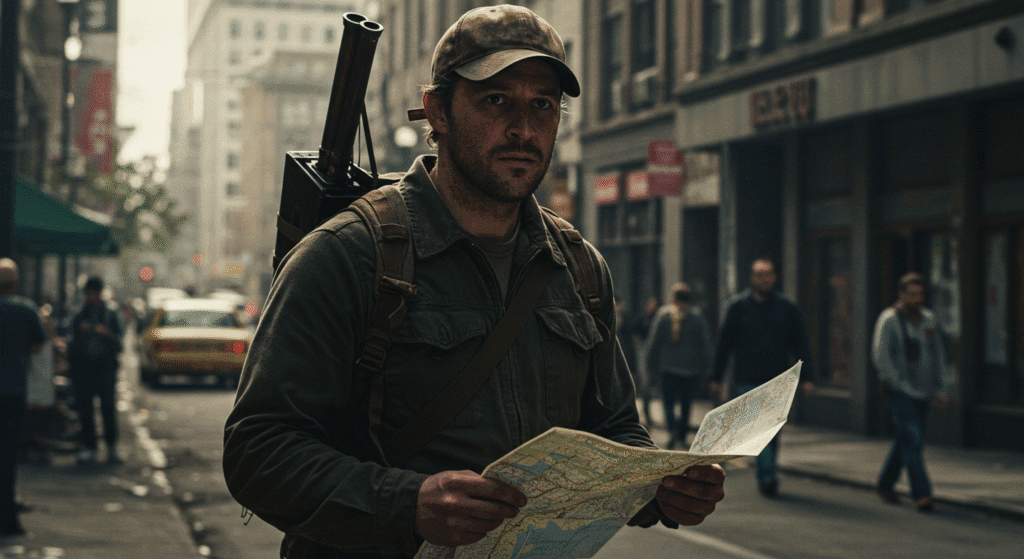
Let's be honest: we all depend too much on our phones to get about. But what if your battery dies while you're attempting to find your way? You start to panic, right? It's really useful to know how to use classic maps (yep, those paper things!) to get about.
Please Note: This post may contain affiliate links. If you click one of them, we may receive a commission at no extra cost to you. As an Amazon Associate, I earn from qualifying purchases.
First, learn how to read street signs and other important places. A good map will show you more than just streets; it will also show you parks, hospitals, and other important places that you might need to know about. I recall the first time I tried to find my way without GPS. I got lost for hours since I didn't thought to check which way was north! So don't forget that compass!
It's interesting that practicing this talent may be pleasurable! Picture getting your buddies together for a day of fun, not with cellphones but with good old-fashioned maps. You may make a scavenger hunt that brings you to parks, hidden lanes, and strange sights in your city. You'll learn how to read paper maps like a pro, and you'll also find out about portions of your community that you never knew about before.
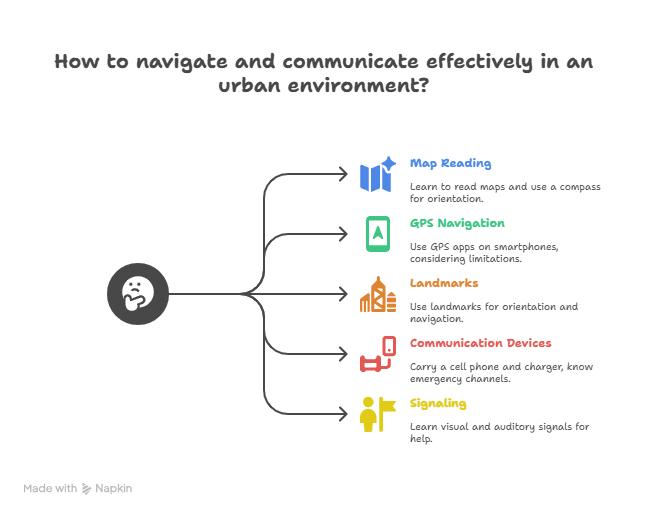
Split up into teams and make some rules to start. Each team gets a map with different places highlighted on it where they have to find certain things or do certain tasks, like shooting silly pictures at a monument or collecting unique leaves from different trees. Everyone can get really competitive when there's a prize at stake, even if it's simply bragging rights. Plus, the fun and friendship that come from working together are worth their weight in gold!
Instead of looking at your phone all day, you'll receive fresh air while you race about town. I mean, why watch another episode of a show that's popular when you can go out and explore the real world? The extra benefit? You'll also be getting some workout. Who knew that learning about navigation could also be good for your heart?
And we shouldn't ignore the talks that happen throughout these trips. “Wait, does this street go left or right?” as you work together to figure out the map. —You'll get closer to each other via both your shared confusion and your shared wins. At the end of the day, you'll have not only gotten better at reading maps, but you'll also have made memories that will last a lifetime, full of fun and maybe even some friendly competition.
So get those maps and get your friends together! A treasure hunt is a fun method to learn how to survive in the city while having fun with everything your city has to offer. You never know what secret treasures you'll find along the way.
*** Shop for Survival Gear - Tools - Kits ***
Survival Gear - Bags and Backpacks - Knives - Boots/Footwear - Communication
Outdoor Cooking - Gloves - Hydration - Dry Boxes - Water Filtration Systems
Tents - Sleeping Bags - First Aid Kits - Multi-Tools - Flashlights - Fire Starters
Navigation - Survival Food - Night Vision - Headlamps - Stun Guns - Binoculars
Basic First Aid Knowledge
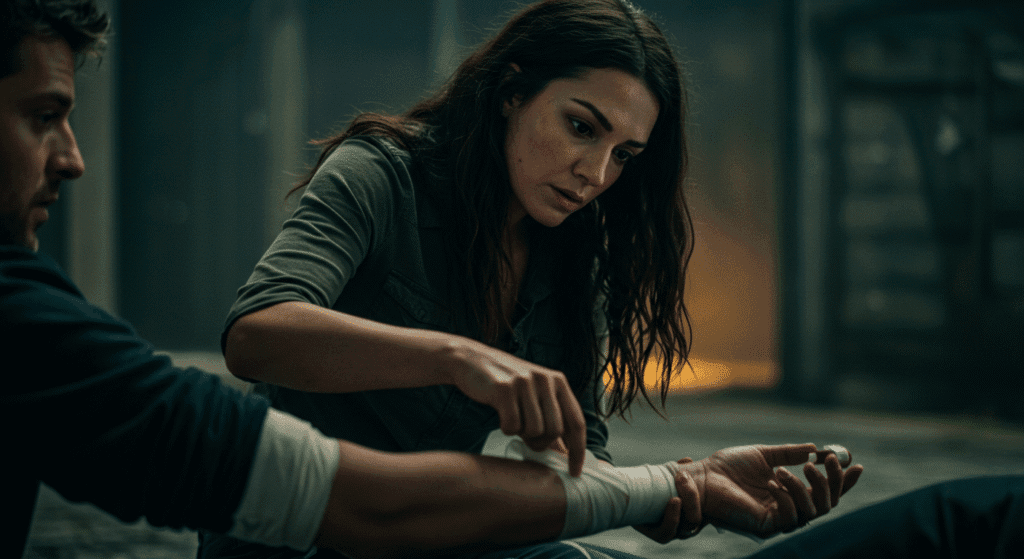
Accidents are certain to happen when you live in a city. For example, you can trip on uneven pavement or someone might get harmed while playing sports. That's why it's important to know how to do basic first aid! If you know how to cure little wounds like cuts or burns, you can be the hero of any crisis.
Get a basic first aid kit together first. You don't need anything fancy; just some band-aids, antiseptic wipes, and gauze will do the trick! And if you're feeling brave (or a little masochistic), you might want to think about taking a first aid class. You should learn how to do CPR, not just lifeguards; it could save someone's life one day!
To be honest, possessing these skills makes you feel more sure of yourself. Think about a time when someone got harmed. Maybe they fell while playing ultimate frisbee or cut their finger while attempting to show off their cooking talents. It feels really fantastic to know exactly what to do in that moment. When others might be too scared to act, there is something quite empowering about stepping up.
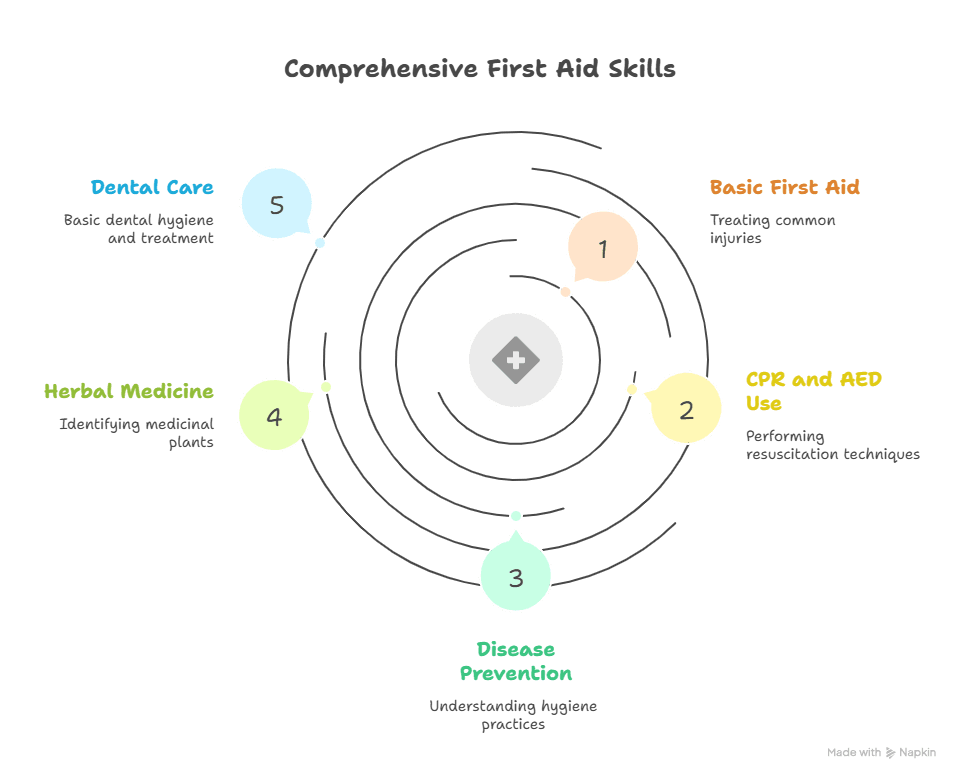
Knowing how to give first aid or respond to an emergency makes you a superhero in everyday life. All of a sudden, instead of standing there uncomfortably, you're moving like a well-oiled machine. You look at the situation, check to see if everyone is breathing (hopefully no one is turning blue), and take care of them until aid arrives. You feel like you can do anything when you get an invisible cape.
And if you show off your skills a few times, people might start to think of you as their go-to emergency guru. Who wouldn't want that title? People will start asking you for help with everything from how to treat a bee sting to what to do when someone eats too many tacos and requires medical help right away (it really does happen!). People will trust you and come to you for help when things go wrong.
This new status not only makes you feel good, but it also makes other people want to learn more about safety and being ready. It starts a chain reaction when friends and relatives take classes or ask questions about what to do in an emergency. Soon, you'll have made a little group of people who know how to stay safe and can handle anything that comes their way.
And let's be honest: it's just cool to be the one who knows how to deal with problems. You become the calm in the storm, like a lighthouse directing ships safely back to port in rough seas. So why not use those skills? Not only do they make you feel more confident, but they also make everyone feel a little safer!
Finding Food in Unlikely Places
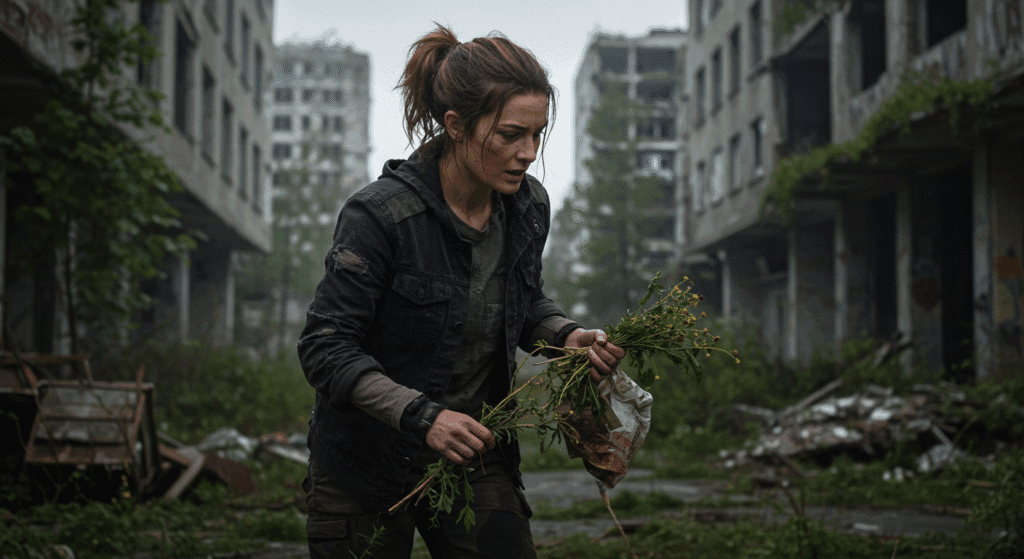
Let's talk about food now, which is everyone's favorite subject! In cities where grocery stores might be hard to find or prices can go through the roof during emergencies (like the toilet paper crisis!), it's really important to know where to get food.
You might be astonished at how many wild plants that you can eat thrive in cities! Dandelions? You can eat them all, and they taste delicious when you sauté them with garlic. You may save money and make your meals more interesting by learning how to forage. Just do some study ahead of time so you don't unintentionally eat something poisonous (that would ruin dinner).
Also, check for community gardens or local farms that sell fresh fruits and vegetables, even if you don't cultivate them yourself. You might be wondering why this is such a huge issue. I can tell you that eating food that was raised in your area is magical. You may feel good about where your food comes from, and it tastes better and is fresher. And the best part? A lot of cities have programs where people can volunteer and get fruits and vegetables in return. You get compensated in salad!
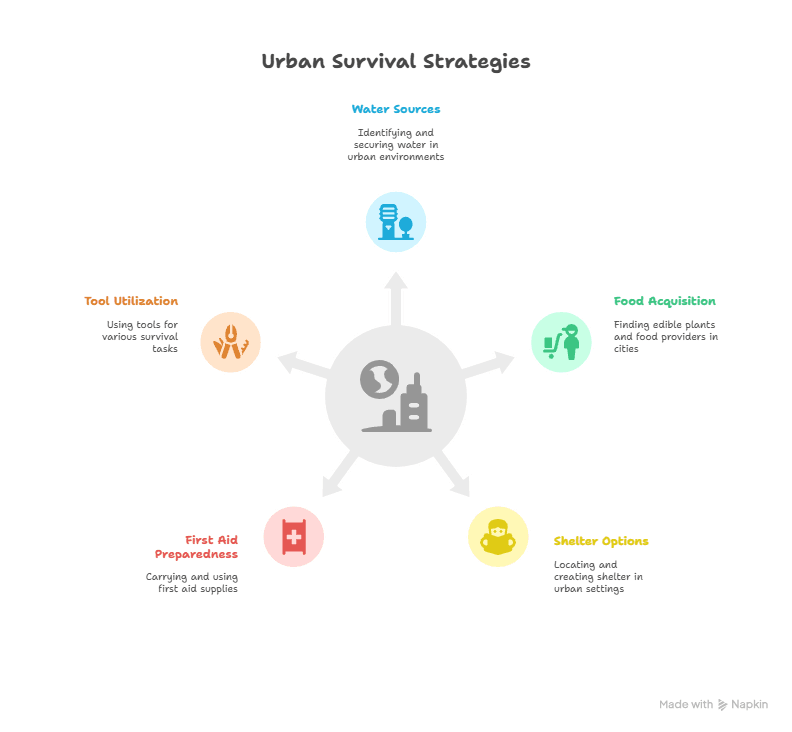
Picture this: on a sunny Saturday morning, you dig in the dirt, pick weeds, and talk to other people who love gardening while enjoying the beauty of nature. Then, at the end of all your hard work, boom! You leave with a basket full of ripe tomatoes, crunchy cucumbers, and herbs that smell good. Why would you need money when you can trade your time for fresh food? And to be honest, nothing matches the feeling of biting into a luscious tomato that you helped cultivate. It's like tasting summer itself.
To be fair, volunteering isn't only about the vegetables, although though they are a nice bonus. It’s also about connecting with your community. You meet others who have the same interests and values as you, like how to make the best pesto or which type of zucchini grows the fastest (hint: it's generally the sly ones!). These contacts can turn into friendships that go beyond gardening. You might meet someone who likes hiking as much as you do or who has a great recipe for homemade salsa.
It's interesting that a lot of community gardens also teach important skills and care about the environment. You might learn about composting (yep, turning kitchen scraps into gold!), crop rotation to keep plants healthy, or even organic pest management methods that don't use any frightening chemicals. This information isn't just helpful for gardening; it also helps you be more aware of the environment in many areas of your life.
And while we're on the subject of advantages, don't forget about health! Fresh fruits and vegetables are full of nutrients that our bodies need. Eating food straight from the garden instead of processed treats from the store aisle is an easy way to feel better. It's like going from dial-up internet to fiber optic—everything just works better!
If you want to eat better or become engaged in your community, you might want to visit local farms or join a community garden program. Not only will you get to eat fresh fruits and vegetables (and perhaps some great salads), but you'll also make friends and learn skills that will make your life far better than what you can find at any grocery store!
Self-Defense Basics
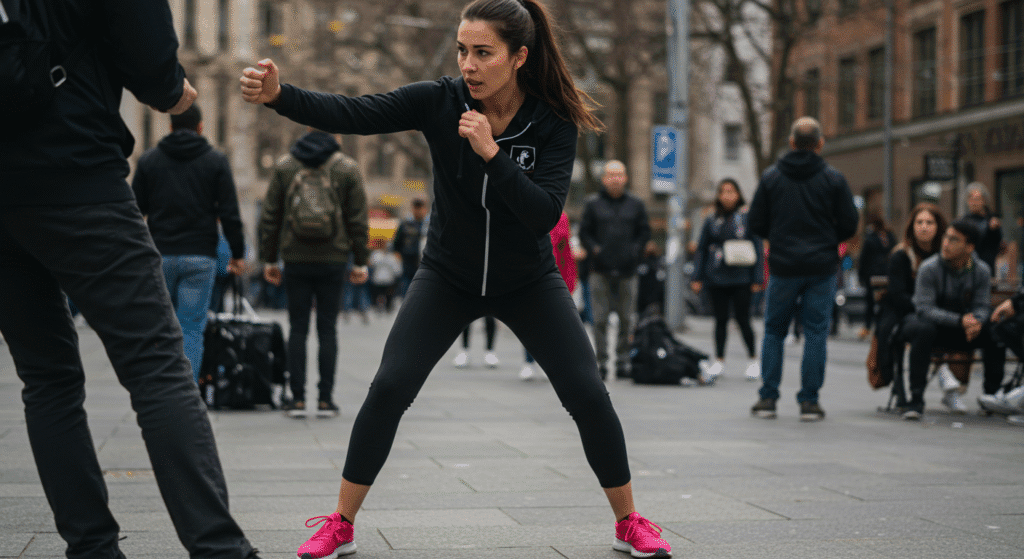
Let's switch gears now from food to personal safety, because let's be honest—living in a city can be dangerous. It's not just smart to know some self-defense basics; it also gives you power.
Think about taking self-defense lessons in your area. They frequently teach basic techniques like how to get out of clutches (goodbye awkward hugs!) and how to use everyday objects as weapons (a pen may be more than just a writing tool!). When your adrenaline kicks in, practicing these strategies often keeps them fresh in your mind!
And speaking of empowerment, it feels great to go through your neighborhood knowing you have the skills you need if something goes wrong. Imagine this: you're walking down the street and feel like a superhero. You've learned important self-defense movements, how to provide basic first aid, and even packed a small emergency kit in your backpack. Believe me, being ready for anything life throws at you is quite comforting.
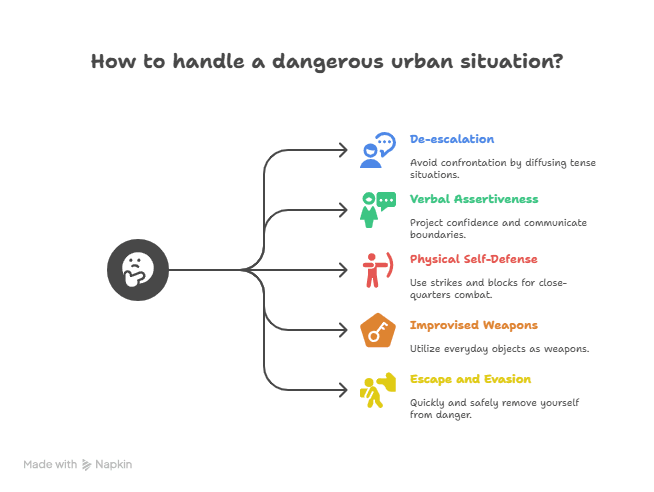
Don't forget about the social side of things! What I like best? You could make new friends who like the same things as you while you acquire useful skills together. Have you ever thought about how going through anything together might make people closer? You're not just learning when you take a self-defense class or go to a community session on how to be ready for emergencies; you're also meeting others who care about safety and resilience as much as you do. It's like finding your family!
Think of how you could bond over funny anecdotes like that one time someone mistakenly set off the fire alarm during a cooking class. Or how everyone had trouble remembering the Heimlich technique at first, but after some practice (and maybe a few laughs), they got it right. These times make memories and connections that linger long after the class or workshop is over.
It's interesting because these abilities don't simply make you feel good; they can also help you work with other people in your community. You might end up setting up neighborhood watch groups or planning group excursions where everyone can practice their outdoor survival skills together. Working with other people to reach similar goals is so satisfying, especially when those goals are to keep each other safe and healthy.
Also, think of how good it feels to know that you're not just taking care of yourself, but also helping others along the way. When you have information, you can help someone else when they need it. Being the person that others can count on, whether it's for help in an emergency or just to share information on how to be safe in cities, is really satisfying.
And let's be honest: who doesn't want to be perceived as trustworthy? These talents also make you feel more sure of yourself. It feels great when someone gets hurt near you and you know exactly what to do. Plus, people might start to see you as their go-to emergency expert. Who wouldn't want that title? When you know you can handle unforeseen scenarios, everyday encounters become spectacular.
Next time you're out and about in your neighborhood, take a moment to think on how far you've come and all the things you've learnt. Being prepared is more than just having the right tools on hand. It's also about making friends and creating a sense of community where everyone watches out for each other. We are stronger when we work together!
Emergency Communication Plans
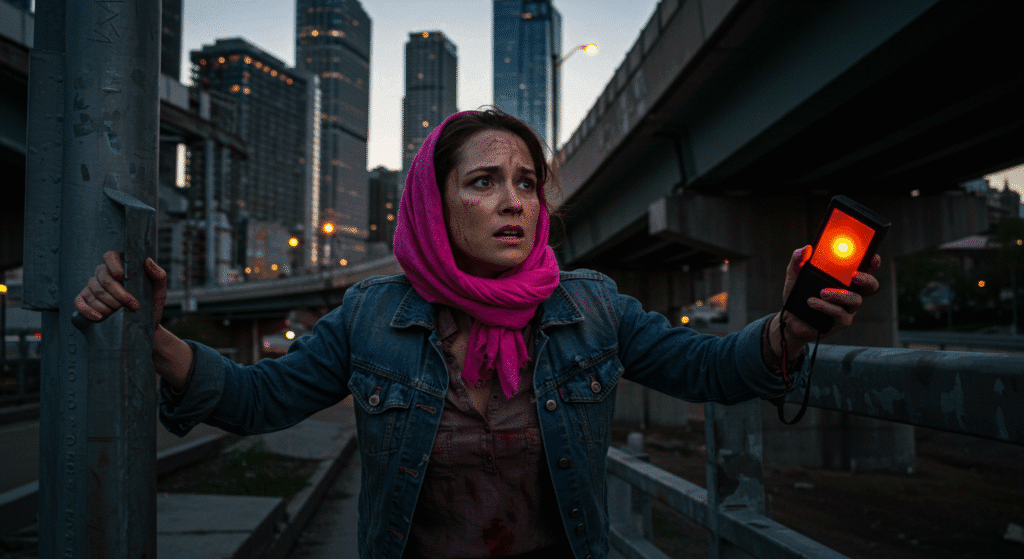
Let's say that a tragedy, like a natural disaster or anything else, happens out of the blue and everyone is rushing around attempting to get in touch with their loved ones. When cell towers go down, things get crazy! An emergency communication strategy makes sure that everyone knows what to do if things go wrong.
First, pick places to meet ahead of time, such “the big tree” at the park or “the coffee shop near our house.” Make sure everyone knows where these places are so that when things go wrong, no one ends up wondering around like a lost puppy.
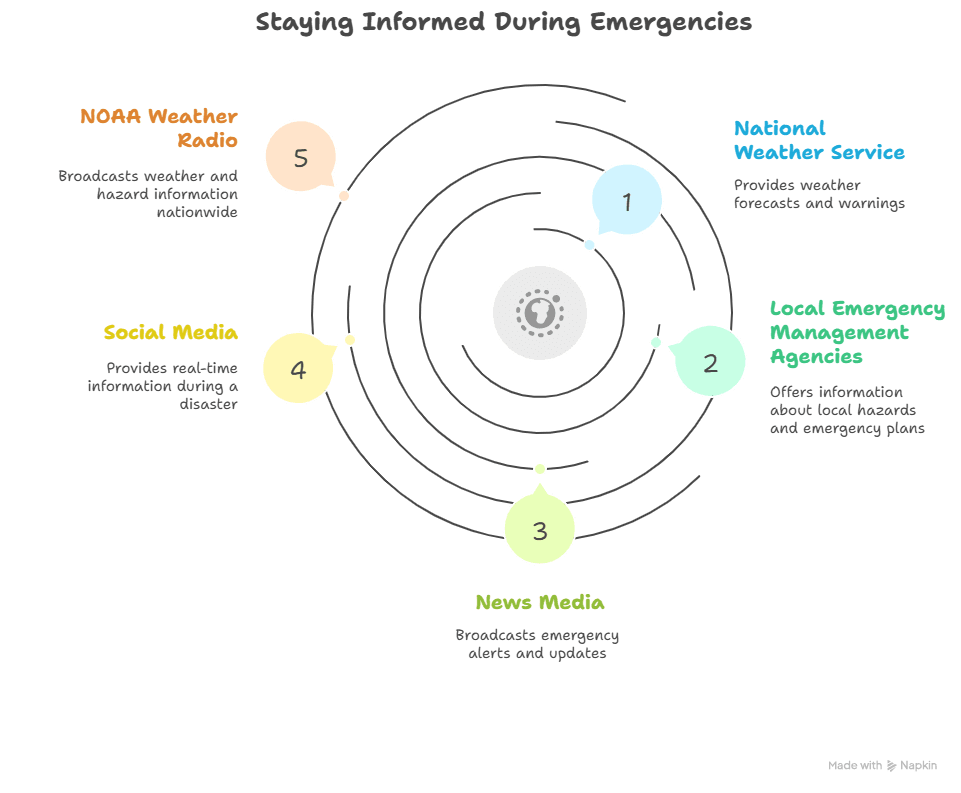
Also, think about setting aside certain periods during the day for check-ins via text or phone calls whenever possible. This can help reduce anxiety because it means there's always a plan B! Think about how nice it is to know that you and your loved ones have set times to talk. It's like having a safety net built into your regular life that will catch you if something unexpected happens.
Picture this: You're out doing errands when all of a sudden, it starts to rain heavily. You might first think, “Oh no! Where did I park?” How do I get home without appearing like a wet rat? But then you recall that you told your partner you would check in with them at noon. You swiftly send a message that says, “Hey! Just checking in to see if everything is okay on your end. And just like that, you feel a little less worried. They not only reassure you, but they also know you're thinking about them!
These periodic check-ins might also help everyone stay up to date on plans or changes that happen every day. For example, if someone has a big meeting or appointment coming up, they can give updates during certain times. This way, everyone knows what's going on in each other's lives and doesn't feel left out or worried. Also, who doesn't like getting a cute text that says “I'm thinking of you”? It's like finding a cookie in the pantry that you didn't know you needed until you saw it.
Let's talk about emergency for a moment now. When things go wrong (and they do sometimes), talking to each other regularly can make a big difference. If something goes wrong—like one person gets stopped in traffic while the other is at home waiting for dinner—you'll already know how to get in touch and work out a solution without things getting out of hand. Imagine this: instead of freaking out because dinner is late and everyone is hungry (a bad mix!), there is already a strategy in place to either make something quick or modify the time of dinner.
It's interesting that these regular check-ins don't always have to be serious. They can also be pleasant times to talk about the best parts of your day or exchange funny memes that made you giggle. You might think of them as small social gatherings that happen in between your hectic times. They provide you an opportunity to connect with others in the midst of all the insanity of life. You could even make them into game-like challenges where everyone has to discuss something fascinating they learned that day or ask strange questions like, “If you could only eat one food for the rest of your life, what would it be?”
In conclusion, setting aside certain periods for communication not only enhances relationships but also helps people feel better about them. Having a backup plan makes people feel better and makes it easier for friends and family to be honest with each other. So why not give it a shot? Put those reminders on your phone right now and see how much more connected and safe everyone feels as life goes on around them!
Staying Calm Under Pressure
Finally, and probably most significantly, maintaining calm under duress is the most important ability for urban survival that anyone can learn. When you panic during an emergency (and believe me, it does happen), it's hard to think clearly without experience.
Meditation and yoga are two examples of mindfulness practices that you should do consistently. They assist your brain deal with daily pressures and make you more resilient overall. When you have to deal with something unexpected, you'll be glad you did this. Panic doesn't help at all!
So keep in mind that the key to getting about without GPS or finding food in concrete jungles is to be prepared and be calm when things get tough.
Frequently Asked Questions
Why are urban survival skills important?
They help you function safely and confidently during city-based disruptions like outages, transit failures, and resource shortages.
How can I navigate a city without GPS?
Practice reading paper maps, understanding street grids, and identifying landmarks so you can orient yourself without digital tools.
What first aid skills should urban dwellers learn?
Basic wound care, CPR, and knowing how to treat minor injuries allow you to respond quickly until professional help arrives.
Are there ways to find food in cities during shortages?
Foraging edible plants, participating in community gardens, and knowing where local urban agriculture sites exist can help supplement food sources.
Is self-defense necessary for urban preparedness?
Learning simple breakaway techniques and how to use everyday objects defensively provides confidence and personal safety in crowded areas.
Why is an emergency communication plan important?
Predetermined meetup points and scheduled check-ins help reunite people when power or cellular networks fail.
How can mindfulness help with urban survival?
Regular calm-training habits like breathing practice improve emotional control, helping you make rational choices during stressful emergencies.
Suggested Resources
Urban Survival Guide
https://www.survivalsullivan.com/urban-survival-guide/
The Ultimate Urban Survival Handbook
https://www.theorganicprepper.com/ultimate-urban-survival-handbook/
Survival Skills Every City Dweller Should Know
https://www.reddit.com/r/survival/comments/7b5t1j/survival_skills_every_city_dweller_should_know/
Emergency Preparedness Tips for Urban Areas
https://www.ready.gov/urban-preparedness

Kevin Collier is a seasoned survivalist and expert in prepping and homesteading, contributing to WiseSurvive.com. With a deep-rooted passion for self-sufficiency and outdoor survival skills, Kevin shares practical advice, strategies, and resources to help individuals prepare for any challenge. His informative articles cover a range of topics, from essential survival techniques to sustainable living practices, empowering readers to thrive in any situation. Whether you're a novice or a seasoned prepper, Kevin's insights will inspire you to take charge of your readiness and build resilience for the future.

